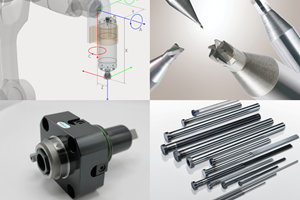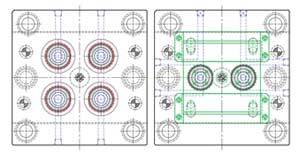Simple Strategies for Providing Value-Add to Your Customers
Five technology solutions to consider that have advantages for both the mold manufacturer and its customers.
When considering ways to reduce mold setup and improve part removal a moldmaker should explore the benefits for both the moldmaker and the molder by considering the following five technology solutions:.
1. Hose hangers are an inexpensive way to keep hoses from interfering with mold setup and part removal. By organizing the hoses on the tool, the mold looks more professional and the moldmaker has provided an inexpensive value-added feature to the molder.
2. Tunnel gate inserts may be purchased as a standard stocked component product for flat, contour, large part as well as edge-gated molding applications. A recent technology improvement to the metal injected one piece tunnel gate insert is the mini insert. Mini tunnel gate inserts are used for the virtually invisible gating of miniature parts weighing between 0.1 grams and 5 g. Used primarily in the automotive, electronics and medical industries, these inserts are particularly suitable for multi-cavity molds. They afford the processor the advantages of side or bottom gating and of reducing the distances between the cavities. The result is a smaller, less costly mold that can then be mounted on a smaller machine with reduced hourly costs. Moreover, sprue waste is minimized through the low channel volume. Because tunnel gate inserts are now a standard one-piece component, the moldmaker can supply a better quality, more inexpensive solution.
3. Mold plaques are available in full color because of thermal set graphic technology. The one-off plaques are available in one or two working days. For the molder they provide greater legibility and understanding for the operator, which leads to easier, safer and quicker mold tryout hookups. For the moldmaker they provide a marketing and branding value that may lead to repeat as well as new business, while providing an overall professional inexpensive value-added feature for the molder.
4. Mold magnets can be used the same as full-color mold plaques; however, they are more portable and can provide additional benefits with their added features. Magnets can be used in a lean manufacturing process as post-it notes for work-in-process. A more popular application is mold storage situations. The moldmaker can take a digital picture of the actual part at tryout and place it directly on the magnet. The moldmaker can supply his company logo along with the customer’s logo and any other vital molding information. This improves the molder’s ability to locate the mold and find the proper press quickly. It also provides the operator a visual of an acceptable part as well as viewing other vital information. Plus, the moldmaker then has another form of advertising to his customer, while providing yet again another inexpensive value-added feature.
5. Tooling data management systems are a recent improvement and alternative to obtaining important mold data information. This involves an industrial application 8-gb flash drive that stays with the mold for the life of the tool. This mold data storage solution can store design schematics and prints, setup and maintenance data, part specs and materials, a bill of materials, part picture and video storage, contracts, repair history and quality control logs. Each unit has a unique ID serial number that is password-protected, which allows many benefits such as online overview and management of the unit. It has password-protected access and file security with file and data encryption. All data can be viewed and updated with secure offsite backup. It assists in ISO compliance and has a multilingual interface. It stores all digital file types and a custom data entry template designer can be created. It enforces a business process while creating corporate branding. The moldmaker can eliminate providing the molder with a traditional mold manual that could get misplaced. The molder can have current information for the life of the tool.
Oftentimes simple technology solutions are overlooked when mold manufacturers are investigating ways to improve their operations, processes, customer support and bottom lines. The aforementioned is just a sampling of innovations on the market to consider.
Related Content
Technology Roundup: New/Improved Technologies You Don't Want to Miss
With all the technology joining the market, moldmaking is a versatile, ever-evolving industry. As such, this technology roundup has no specific theme — it features a variety of products for applications and solutions across the industry.
Read MoreVIDEO: Taking a People Before Product Approach to Growing a Business
Angela Elsey, President of PCS Company, shares her journey into moldmaking, perspective on the industry and plans for the business.
Read MoreThe Lowdown on Guided Ejection Systems
Learn more about guided ejection systems in terms of when, where, how and why to use them to benefit you as the moldmaker. Use this guide to better understand best practices associated with guided ejection systems.
Read MoreRadial Springs to Center Floating Inserts for Alignment
Progressive Components introduces Radial Springs, which lift and center floating inserts to pre-align cores before a mold's cavity interlocks engage.
Read MoreRead Next
Cost of Ownership: A Lifetime of Molding Savings
“There’s nothing more expensive than a cheap mold,” has been said by many a tooling engineer after a bargain of a mold began bleeding profits.
Read MoreAre You a Moldmaker Considering 3D Printing? Consider the 3D Printing Workshop at NPE2024
Presentations will cover 3D printing for mold tooling, material innovation, product development, bridge production and full-scale, high-volume additive manufacturing.
Read MoreHow to Use Strategic Planning Tools, Data to Manage the Human Side of Business
Q&A with Marion Wells, MMT EAB member and founder of Human Asset Management.
Read More

















